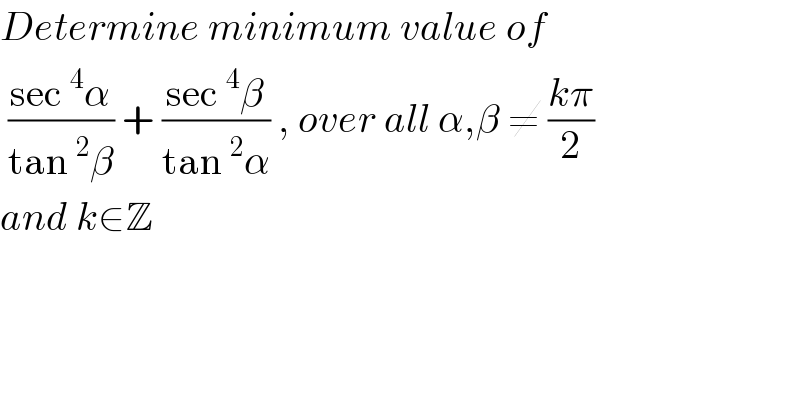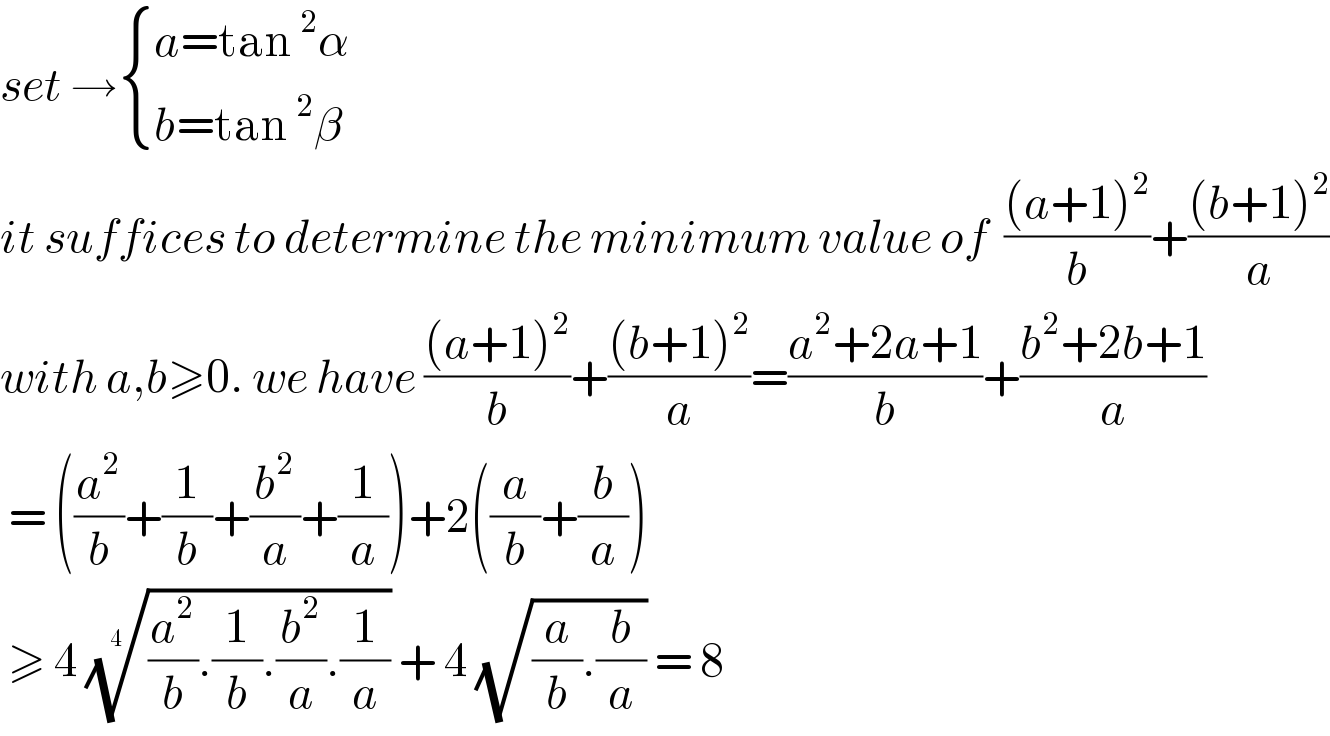
Question and Answers Forum
Question Number 119372 by bobhans last updated on 24/Oct/20

Answered by 1549442205PVT last updated on 24/Oct/20
![S= ((sec^4 α)/(tan^2 β)) + ((sec^4 β)/(tan^2 α)) = (1/(cos^4 α)).((cos^2 β)/(sin^2 β))+(1/(cos^4 β)).((cos^2 α)/(sin^2 α)) =(((1+tan^2 α)^2 )/(tan^2 β))+(((1+tan^2 β)^2 )/(tan^2 α)) Applying Cauchy−Shwardz we have S≥(((2+tan^2 α+tan^2 β)^2 )/(tan^2 α+tan^2 β)) =((4+(tan^2 α+tan^2 β)^2 +4(tan^2 α+tan^2 β))/(tan^2 α+tan^2 β)) =4+[tan^2 α+tan^2 β+(4/(tan^2 α+tan^2 β))] =4+((√(tan^2 α+tan^2 β))−(2/( (√(tan^2 α+tan^2 β)))))^2 +4≥8.The equality ocurrs if and only if { (((√(tan^2 α+tan^2 β))=(2/( (√(tan^2 α+tan^2 β))))(1))),((((1+tan^2 α)/(tan^2 β))=((1+tan^2 β)/(tan^2 α))(2))) :} (2)⇒tan^4 α+tan^2 α=tan^4 β+tan^2 β ⇔(tan^2 α−tan^2 β)(tan^2 α+tan^2 β+1)=0(∗) (1)⇒tan^2 α+tan^2 β=2.Replace into (∗) we get tan^2 α=tan^2 β=1 Thus,S= ((sec^4 α)/(tan^2 β)) + ((sec^4 β)/(tan^2 α)) has smallest value equal to 8 when tan^2 α=tan^2 β=1](Q119419.png)
Answered by bemath last updated on 24/Oct/20

| ||
Question and Answers Forum | ||
Question Number 119372 by bobhans last updated on 24/Oct/20 | ||
 | ||
Answered by 1549442205PVT last updated on 24/Oct/20 | ||
![S= ((sec^4 α)/(tan^2 β)) + ((sec^4 β)/(tan^2 α)) = (1/(cos^4 α)).((cos^2 β)/(sin^2 β))+(1/(cos^4 β)).((cos^2 α)/(sin^2 α)) =(((1+tan^2 α)^2 )/(tan^2 β))+(((1+tan^2 β)^2 )/(tan^2 α)) Applying Cauchy−Shwardz we have S≥(((2+tan^2 α+tan^2 β)^2 )/(tan^2 α+tan^2 β)) =((4+(tan^2 α+tan^2 β)^2 +4(tan^2 α+tan^2 β))/(tan^2 α+tan^2 β)) =4+[tan^2 α+tan^2 β+(4/(tan^2 α+tan^2 β))] =4+((√(tan^2 α+tan^2 β))−(2/( (√(tan^2 α+tan^2 β)))))^2 +4≥8.The equality ocurrs if and only if { (((√(tan^2 α+tan^2 β))=(2/( (√(tan^2 α+tan^2 β))))(1))),((((1+tan^2 α)/(tan^2 β))=((1+tan^2 β)/(tan^2 α))(2))) :} (2)⇒tan^4 α+tan^2 α=tan^4 β+tan^2 β ⇔(tan^2 α−tan^2 β)(tan^2 α+tan^2 β+1)=0(∗) (1)⇒tan^2 α+tan^2 β=2.Replace into (∗) we get tan^2 α=tan^2 β=1 Thus,S= ((sec^4 α)/(tan^2 β)) + ((sec^4 β)/(tan^2 α)) has smallest value equal to 8 when tan^2 α=tan^2 β=1](Q119419.png) | ||
| ||
Answered by bemath last updated on 24/Oct/20 | ||
 | ||
| ||